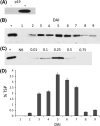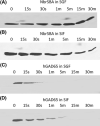High-yield expression of recombinant soybean agglutinin in plants using transient and stable systems
- PMID: 20559869
- PMCID: PMC7477883
- DOI: 10.1007/s11248-010-9419-0
High-yield expression of recombinant soybean agglutinin in plants using transient and stable systems
Abstract
Soybean agglutinin (SBA) is a specific N-acetylgalactosamine-binding plant lectin that can agglutinate a wide variety of cells. SBA has great potential for medical and biotechnology-focused applications, including screening and treatment of breast cancer, isolation of fetal cells from maternal blood for genetic screening, the possibility as a carrier system for oral drug delivery, and utilization as an affinity tag for high-quality purification of tagged proteins. The success of these applications, to a large degree, critically depends on the development of a highly efficient expression system for a source of recombinant SBA (rSBA). Here, we demonstrate the utility of transient and stable expression systems in Nicotiana benthamiana and potato, respectively, for the production of rSBA, with the transgenic protein accumulated to 4% of total soluble protein (TSP) in Nicotiana benthamiana leaves and 0.3% of TSP in potato tubers. Furthermore, we show that both plant-derived rSBAs retain their ability to induce the agglutination of red blood cells, are similarly glycosylated when compared with native SBA, retained their binding specificity for N-acetylgalactosamine, and were highly resistant to degradation in simulated gastric and intestinal fluids. Affinity column purification using N-acetylgalactosamine as a specific ligand resulted in high recovery and purity of rSBA. This work is the first step toward use of rSBA for various new applications, including the development of rSBA as a novel affinity tag for simplified purification of tagged proteins and as a new carrier molecule for delivery of oral drugs.
Figures





References
Publication types
MeSH terms
Substances
LinkOut - more resources
Full Text Sources
Miscellaneous

